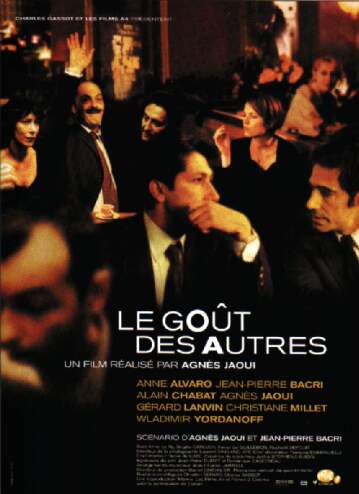- The Taste of Others
Infobox Film
name = The Taste of Others

image_size = 240px
caption = French poster
director =Agnès Jaoui
producer =Christian Bérard Charles Gassot Jacques Hinstin
writer = Agnès JaouiJean-Pierre Bacri
narrator =
starring =Anne Alvaro Jean-Pierre Bacri Alain Chabat Agnès JaouiGérard Lanvin
music =Jean-Charles Jarrel
cinematography =Laurent Dailland
editing =Hervé de Luze
distributor =Pathé
released =
runtime = 112 min
country = France
language = French
budget =
preceded_by =
followed_by =
website =
amg_id =
imdb_id = 0216787"The Taste of Others" (French title: "Le goût des autres"), is a 2000 French film. It was directed by
Agnès Jaoui , and written by her andJean-Pierre Bacri .It stars Jean-Pierre Bacri,
Anne Alvaro ,Alain Chabat , Agnès Jaoui,Gérard Lanvin andChristiane Millet .The movie won the
César Award for Best Film , Best Supporting Actor, Best Supporting Actress and Best Writing in 2001, and was nominated for anAcademy Award for Best Foreign Language Film . It currently ranks ninth onRotten Tomatoes as best reviewed movie, with 100% positive reviews.Plot
Castella (Bacri) owns a steel factory. To conduct a deal with Iranians, he is told he must learn English, so he hires Clara (Alvaro) to teach it to him. His wife, Angelique (Millet), is an interior decorator who is working on Castella's sister's apartment, and loves her dog. They go to the theatre, where their niece is performing in a production of "
Bérénice ", accompanied by his driver, Bruno (Chabat), and his temporary bodyguard, Franck (Lanvin). While there, he sees Clara, who is an actress. Meanwhile, Franck sends Bruno to the bar to buy cigarettes. The barmaid, Manie (Jaoui), remembers having had sex with Bruno, but Bruno regrets that he does not remember her.After the performance, Clara goes to the bar with her friends, including Antoine and Valerie, and their conversation reveals that she is afraid of never working again; after all, she is forty years old. Bruno, whose fiance is doing an internship in America, spends the night with Manie, who it turns out sells drugs on the side, and is frequently visited by clients. Franck meets Manie through Bruno and they start a relationship.
Previously uninterested in theatre, Castella attends with his wife and develops a fascination with Clara's bohemian lifestyle. He alone attends another production she appears in. He joins her and her friends for lunch and attends an art show where he buys a piece. However, his cultural ignorance makes him a laughing stock. Clara confides to her friend Manie that he is thick.
Castella's English is poor at first, but he soon makes progress. He and Clara move the classes from his office to an English tea room, and to mark his progress, he writes a poem dedicated to Clara; however, he is dismayed when she says that she does not share the feelings expressed in the poem. One day she waits at the tea room and he doesn't show up. Bruno practices his flute, which he plays in a band.
Castella and Angelique are drifting apart, as indicated by how she doesn't like the painting he bought from Clara's artist friend. Clara starts to feel that her friends are taking advantage of Castella and tells him. Castella leaves Angelique. Franck's contract finishes, and he breaks off his relationship with Manie. Clara lands the lead part in "
Hedda Gabler " and invites Castella to the opening. After seeing an empty chair all night, Clara is overjoyed to see him later in the audience.External links
*imdb title|0216787
###@@@KEY@@@###succession box
title=César Award for Best Film
years=2001
before="Venus Beauty Institute "
after="Amélie "
Wikimedia Foundation. 2010.
